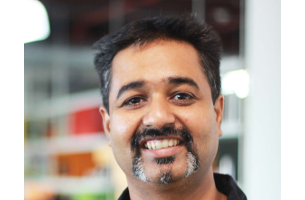
Quick-Fire Questions with Tanay Kumar, CEO of Fractal Ink Design Studio - Linked by Isobar

After welcoming the leading digital design studio in India, Isobar caught up with Tanay Kumar, Co-Founder, CEO and Chief Creative Officer of Fractal Ink Design Studio - Linked by Isobar.
Q> Hi Tanay, and welcome to you and the Fractal team to the Isobar family! Firstly, why did you want set up Fractal Ink Design Studio?
Tanay Kumar> Let me just start with thanking the whole of Isobar family for a such a hearty and a warm welcome into the group.
As far as I remember, it was over a cup of coffee where four of us Geeta, Priyanka, Hemant and myself decided to come together to form Fractal.
Moving back from London in 2010 was a very conscious decision for Priyanka (COO and Chief Experience Officer) and myself, which was invested more in the vision of starting up this entity rather than patriotism. Our exposure to experience design and its role in the modern world formed the basis of starting this company with Geeta (COO and Chief Business Officer) and Hemant (Co-founder) who were already running a design studio.
At the time, internet and mobility in India was still a luxury. India was largely considered more of a technology back end for the world. Our early hypothesis into how digital will enter people’s lives and the absence of this philosophy around gave us a strong reason to start Fractal. One single point focus drives the company and that is “technology alone does not drive growth but its adoption does” and the the sooner we realise this the faster we will grow. Hence we built our company not only around design, but around creating experiences that will excite, delight and be useful to people.
Q> Before establishing Fractal, what did you do?
TK> To start with a bit of history, I come from a small town of Jamshedpur in India, better known as the steel city of India. The growing years were absolutely wonderful in this city.
I come from a very modest middle class background and my early years were far from design as a subject. Coming from a time where engineering and medical were the only respected professions to pursue, design was probably a subject to be taken up if you really had no other choice. I remember the times when my Dad had to explain my choice of subject to his peers and found it really hard to define it!
Priyanka and I started a small boutique Design Studio called Ambiaance Designs in 2001. In 2006 we wrapped up Ambiaance and flew to London to try our hands in foreign waters which I think was a turning point in our journey. The exposure of working with different cultures in evolved markets gave an insight into possibilities which were unseen till now.
While in London, I was a part of one of Europe’s largest digital agencies, LBI (now Digitas LBI) for close to 5 years as Creative Head (LBi India) where my role was to stabilise relationships between two markets and bring best practices from London to India.
This brief stint gave us an opportunity to view design and user experience as a much bigger game changer. With established processes and the knowledge of leading effective design teams, in 2010 Priyanka and I thought it was time now to build something bigger than what we had previously done.
Q> Fractal was set up in 2010, and has grown rapidly. What has been your key to success?
TK> Key to success can be largely attributed to the awesome set of people we were able to get around us to build this. Right timing and the right set of talent to drive it helped Fractal to catapult its growth story.
At the time when the majority of India was invested in building web presence, we built our talent around mobility quite early on. Coming from an experience design background it didn’t take much for us to deconstruct the phenomenal change this would bring about in the country. This helped us cut through our competition and drive our vision for products rather than just the design of them.
With wonderful clients who saw our passion to drive this and trusted us with their vision, helped Fractal to create ground breaking initiatives in the industry. We at Fractal train to think “what if” rather than “what is” and that is what, I think, keeps us ahead of the game.
Q> In the Brand Commerce world we live in today, what role does UI and UX play?
TK> I think the term UI and UX gives a very myopic view of the kind of role experience design plays in today’s Brand Commerce world. With the influx of some mind blowing innovation in technology, our expectation from the brands have evolved immensely. These innovations are now driving convergence of content, commerce and brand storytelling into building a relationship with the consumer.
Brands today cannot sit back and enjoy their monopoly. It is no longer only about user-experience on their digital platforms, but an omni-channel customer experience approach. They have to constantly be on the lookout for opportunities to engage and enhance the consumer experience at all touch points in the journey. This is where I think the role of experience designers become extremely important.
Q> POOL recently awarded Fractal the title of ‘India’s Best UI/UX Design Studio’. What has been your favourite piece of work to date?
TK> When you actually focus on your core strengths as a company the recognition is a byproduct. POOL’s award was definitely a high point in Fractal’s life and an affirmation of our core values and vision. I do not think there has been any one piece of work which can be termed as being favourite, but yes, there have been some challenging assignments which brought out the best in us.
We worked with a fitness start up called GOQii, where our expertise were pushed beyond just the interface and experience design. It was one of our first clients from India and helped fractal establish its expertise in thinking about a digital ecosystem and not just an interface.
Also, a project with Microsoft and their campaign to push design to the forefront with their new operating system helped us build some amazing connections in the industry. We went on to build more than 500 experiences on the new OS which was very gratifying.
Q> Since Fractal was set up in 2010, how have you seen the UI/UX and creative landscape change and evolve?
TK> It definitely has undergone a lot of change and all for the good. In 2010, when we came back from London, India was still in a phase where few people even knew the term ‘user-experience’. We had to explain to clients what it meant and why it is important, but convincing them to pay for it was a tough deal to crack. Cut to 2016, clients demand to know the full blown process that we as an experience design studio undertake.
Design thinking as a term is today part and parcel of every industry. Although the basic rules and process of design has not undergone any major change, its importance in people’s mind has grown exponentially.
In today’s highly competitive world where easy access to technology has brought power to innovate in everybody’s hands, design today has started to act as a lever for the industry to help them establish themselves as different. Today companies are looking at experience designers to help deliver similar services to a highly targeted audience with a difference that can drive adoption.
Q> Which markets around the world are currently leading the way in UI and UX?
TK> I think it will be unfair to divide the geography and identify a particular market which is leading. Today we are seeing the globe become smaller and smaller from technology standpoint as opposed to experience design as a discipline that is highly rooted in the culture and people whom you are designing for.
There are some economies which are highly evolved and the innovation required in those markets are very different from the ones where people are still grappling with the idea of the connected world. For example, India as a country completely skipped the generation of laptops and computers. For more than 70% of the population, mobile is their first encounter of a connected experience. There were no patterns of browsing or learning from big screen world which could have been considered while designing experiences for mobile, unlike the west where there was a whole lot of unlearning required to get people accept mobile as their primary experience.
If I had to strictly map innovation, the Asia Pac region presents more challenges, hence more opportunity to lead this, and America and some parts Europe and Britain leading the way.
Q> Finally, if you could give one piece of advice to a client about the importance of UI/UX, what would it be?
TK> One single piece of advice would be to consider thinking UI and UX or experience design not as a layer on top of technology but as one of the underlying principles of their product story. Design thinking brings about a fundamental change in the way you think about a product or a service. It brings you a step closer to your audience the day you decide to have this discipline as your core.













